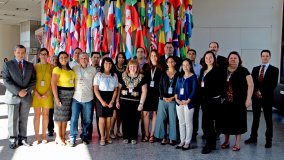Set up in 2010, the IAEA Water Availability Enhancement Project is an initiative aimed at helping Member States improve the long-term access to freshwater by using science-based, comprehensive assessments of national water resources.
Helping countries undertake comprehensive water resource assessments
IWAVE’s primary goal is to strengthen national capacities for collecting, managing and interpreting water resource data and to use advanced techniques to improve resource management. The initiative, which is funded through the Peaceful Uses Initiative, started its work in three countries: Costa Rica, Oman and the Philippines. The IAEA works with partners and national counterparts in these countries to identify existing gaps in national hydrological information, with an emphasis on groundwater.
Fundamental hydrological data and the understanding of this information is essential to conduct a comprehensive national water resource assessment in a country. This is why IWAVE focuses in the first place on finding out whether the necessary hydrological data is available and properly understood. Comprehensive water resource assessments consider such issues as water quality, water quantity and water use, as well as resource vulnerability and sustainability.
Once a comprehensive water resource assessment is in place, attention shifts towards national decision-makers. Under the umbrella of the project, the IAEA helps build initiatives that provide them with reliable tools to better manage their water resources, in the hope that better access to information at the national level will also result in greater cooperation when it comes to dealing with water resources across national borders.




